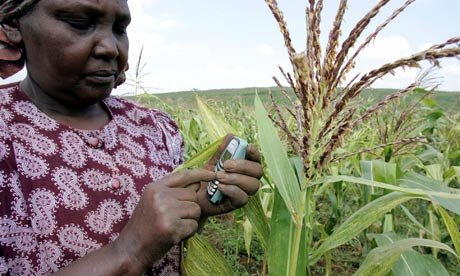
A Kenyan farmer sends a text message to enquire about the latest maize prices from her maize field in Thigio, near Nairobi. Photograph: Antony Njuguna/Reuters
Data collection and monitoring and evaluation (M&E) are a vital part of development work, as the results determine where public services are most needed, and what approaches prove effective.
Traditionally, pen and paper have been used to collect data in the field and for monitoring and evaluation of projects in rural areas. However, this approach is time consuming and susceptible to human error that may affect productivity and accuracy. Information and communication technologies are now being used widely with remarkable positive results to perform these tasks in agricultural development projects.
In a recent global discussion organised by the World Bank and e-Agriculture, experts from various fields and organisations around the world shared their experiences and discussed the ways in which they were using ICT – mobilephones, tablets, applications and software – to collect data in the field, and to perform M&E in development projects, while also working closely with rural communities and taking their feedback. The discussion has been summarised in a policy brief and outlines the benefits of using ICT for data collection. Several examples of theapps were also showcased in the discussion, among those:
An iOS mobile data collection platform that features an application that requires no paper or connection and is available worldwide. This application is being used for data collection in over 110 countries and it allows real time data upload and offline data collection, while immediately sending any updates to a mobile workforce with server assignment. Catholic Relief Services used iFormBuilder to register and distribute vouchers to beneficiaries during a seed fair in Central African Republic, and they were able to save over a week of preliminary work and reduce staff by 50%.
Cropster is an initiative that seeks to support sustainable agriculture by empowering farmers with access to key information and ensuring data transparency. It enables them to make informed decisions, and also supports people and communities at all levels of supply chain. This app offers an M&E tool that facilitates data collection as well as the exchange of information within producer groups, NGOs and commercial partners in Latin America. This tool provides decentralised monitoring, real-time information, and the ability for users to customise data and verify input.
An award winning mobile app that lets users create an account, design forms, download them to their mobile phones, collect data and send it to a server. According to a World Bank report, in 2010, nine data collectors used EpiSurveyor to interview beneficiaries in 25 municipalities in a secondary survey (the first one, conducted in 2009, used paper and pen) in a World Bank Conditional Cash Transfer project in Guatemala. Digitisation cut the cost of an interview by 71%, increased the sample size from 200 to 700 beneficiaries, and reduced the individual interview time by 3.6%.
Experts who participated in the e-forum also agreed on important factors that should not be overlooked:
• Technology itself is not sufficient, a well trained team is also required: case studies show that investing solely in technology will not ensure successful implementation of ICT applications; it is necessary to invest in a team that can effectively perform M&E tasks, as well as to invest in capacity development of the end users who can ensure the sustainability of the project.
• Complex ICT or complex platforms are not necessarily essential:technologies already being used by farmers should be taken into consideration. For example, USAid's Feed the Future project employs a combination of traditional instruments to collect basic data in the field, which is then recorded in Excel sheets and subsequently shared free of cost with potential buyers in real-time through Drop Box.
• Contextual factors: local factors such as the lack of adequate resources must be taken into account beforehand (eg electricity, gender issues, limited network coverage and low bandwidth, local languages). Implementation approaches need to identify the specific needs of the intended users by working in collaboration with them. There is not one single solution that fits all projects: context, policies, marketing efforts and incentives are all essential factors to ensure participation from community members.
• Data integrity and security must be ensured throughout the project and when using ICT applications. Experts agreed that leveraging location data and other metadata with individual records helps maintain integrity.
There are remarkable examples of various development agencies currently using ICT for data collection and M&E in the agricultural sector worldwide.
Δεν υπάρχουν σχόλια:
Δημοσίευση σχολίου